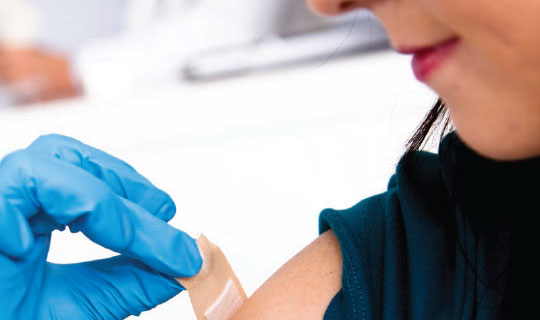Ask your doctor which shots you must have to protect yourself.
When you think about vaccinations, you probably think about the shots children begin to get in the first months of life. But adults also need to get vaccines. Protection from vaccines a person received as a child can wear off over time. In addition, thanks to medical advances, many new vaccines are now available.
Nonetheless, every year, many adults don’t get their shots, and as a result become seriously ill with preventable diseases, according to the U.S. Centers for Disease Control and Prevention (CDC). “There’s now a list of 12 types of adult vaccines that are recommended,” says Thomas Kowalenko, DO, a family practitioner and Chair of the Department of Family Medicine at Robert Wood Johnson University Hospital (RWJUH) Rahway. “But the type of vaccine needed, and the timing, can vary from person to person. The topic really deserves a discussion with your doctor.”
An individualized approach
“The flu vaccine is recommended every year for everyone age 6 months and older, with a few exceptions, and you can get that at a pharmacy or community health clinic,” says Dr. Kowalenko “But you should definitely check in with your doctor, because he or she is the one who is going to put the whole schedule of vaccinations together for you.”
Recommendations can be tailored to the patient. For example, the CDC recommends the pneumococcal (pneumonia) vaccination to those age 65 and older. But the way a person gets the vaccine can vary. Guidelines for the current vaccine require a sequence of Prevnar (PCV13) first, followed by Pneumovax (PPSV) at least one year later.
For at-risk patients, however, the one-year waiting period may be shortened to eight weeks. “Furthermore, certain at-risk patients, such as smokers and diabetics, may be recommended to have the pneumococcal vaccine at a much younger age than age 65,” Dr. Kowalenko says. “The same holds true for someone who has had their spleen removed, and is therefore more susceptible to certain bacterial infections.”
"Childhood" diseases
The CDC recommends vaccinations for shingles (herpes zoster) for healthy adults ages 50 and over. The risk of getting shingles, a painful rash with blisters that can linger for months, increases as a person ages. Because shingles and chicken pox are caused by the same virus, many adults wonder if they may be immune to shingles because they had chicken pox in childhood. Not so, says Dr. Kowalenko.
“The first time you are exposed to the virus, you typically get the chicken pox,” he explains. “After you recover, the virus stays in your body, dormant in the nerve cells, and can reactivate and recur as shingles. “So if you have had chicken pox, you should get a shingles vaccination because you already have the virus in your nervous system. But even if you never had chicken pox, you should still get the vaccination because chicken pox is a more serious infection for an adult than for a child.”
Furthermore, even if you have had shingles, you should still get the latest version of the vaccine to increase your immunity and reduce the risk of a second episode. As for measles, the disease had been virtually eliminated by vaccines in the U.S. by the year 2000, but has recently recurred, especially in communities where groups of people are not vaccinated.
“Adults who had the measles as children, but who are concerned about it now, should get a blood test that can tell definitively whether they have immunity,” says Dr. Kowalenko. “This is the only way to know for sure whether you need an additional dose of the vaccine.” What about booster shots for vaccines previously received? “Different vaccines have different periods of time that they are effective,” Dr. Kowalenko explains.
“Many vaccines give lifelong immunity, and others, like the tetanus shot, require repeat doses to restimulate the immune system and cause the level of immunity to rise again. “You or your doctor must check with the manufacturer of each specific vaccine and with sources such as the CDC. Recommendations can change over time.”
To find a primary care physician at RWJUH Rahway, call 888.724.7123.
